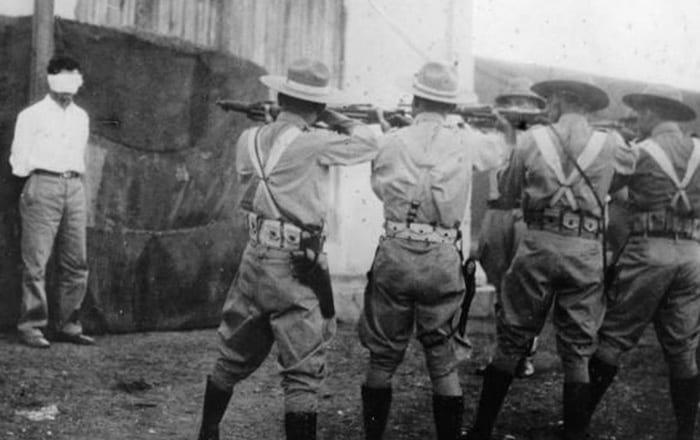
by Paul Dail
Devil’s advocate: A person who, given a certain issue, takes a position he/she does not necessarily agree with—or simply an alternative position from the accepted norm—for the sake of debate or to explore the thought further.
On Wednesday, Feb. 11, Independent columnist Marcos Camargo wrote an opinion piece inspired by the recent article in the Salt Lake Tribune which stated that Utah is getting closer to returning to the firing squad as a secondary means of executing death-row inmates, an option which was previously in effect until 2004. Camargo takes the side of the ACLU and other opponents to capital punishment that it is time to start talking about ending the practice altogether. While I agree with some aspects of Camargo’s assessment of the failings of capital punishment, I don’t foresee an end to it in the near future. And if we’re going to continue executing inmates, it should be by firing squad as opposed to lethal injection.
The good intentions
Well, pretty much all of Camargo’s article falls into this category. As he mentioned, there have been several botched lethal injection executions over the past year as a result of the fact that the 32 states still carrying out lethal injections are having to find alternatives to traditionally used drugs which suppliers are now deciding they don’t want to sell for executions. Some of these alternate drug combinations have yet to even be approved by the FDA.
In July of 2014, the U.S. Supreme Court walked away from one of these cases with egg on their face after lifting a stay of execution for Arizona death-row inmate Joseph Rudolph Wood, who had claimed a First Amendment right to know more about the drugs which the state was going to use to execute him. It took Wood nearly two hours to die, during which it was reported by his lawyers: “He has been gasping and snorting for more than an hour . . . He is still alive.”
So while lethal injection may look prettier than other methods of execution, it’s not looking good for the future of the practice. Having said that, do we eliminate the death penalty altogether? And if not, how should it be carried out?
Heading there one way or another
There’s an old saying about good intentions and the paving of a certain road. When the road leads to a place that many of our country’s faithful believe these convicted murderers are going anyway, the question is whether we should be the ones to send them there.
On one hand, I agree with Camargo’s assessment of the motives behind the death penalty. It’s about vengeance. There is no denying that. This is Old Testament stuff we’re talking about. Even though Mahatma Gandhi biographer, Louis Fischer, when referring to Gandhi’s approach to conflict resolution said “Satyagraha is the exact opposite of the policy of an-eye-for-an-eye which ends in making everyone blind,” we still live largely in a country that prefers the words of Exodus.
And even though we are also (and perhaps moreso) instructed to listen to the New Testament words that “[W]hoseover shall smite thee on thy right cheek, turn to him the other also,” you only have to look at the popularity of movies about revenge (see: “Taken” as just one example among many) to realize that most of us have either entertained the idea of an act of revenge or actually carried one out.
However, contrary to Camargo’s assertion that revenge is “some outlet to unleash our most primal reptilian-brained instincts,” I’d say it’s a very human response, reflective of some of our strongest passions and complex emotions, especially when it comes to the loss of a loved one.
While it’s not entirely unheard of, it’s rarer for a surviving friend or family of someone who was murdered to forgive the transgressor. And damned hard, I bet. For those who have never lost someone, it’s much easier to stand on the sidelines and say we should abolish the death penalty. I should know; I’ve been there myself, toeing the pacifist line that killing the killer doesn’t bring back the victim.
Then I met my amazing wife.
And had two beautiful children.
These aren’t my reptilian-brained instincts. This is about the bonds we form with others, about love so deep it hurts sometimes. The thought of someone putting their hands on my four-year-old daughter in violence—let alone murder—is an example of that hurt.
While I want to say that if she were murdered, I’d recognize that nothing would bring her back, I still think I would want that person dead. And not just “rotting in a prison cell,” because let’s face it, prison would probably suck, but you still get to wake up every morning, to draw a breath.
I don’t think any of us can really say for certain we would be more “evolved” about revenge for the loss of a loved one until we were in the actual situation to make such a decision, even if only in our own heads.
And if you’re in opposition, I want you to do something. Stop for a moment and think about one of the people you love most in the world. Now think of that person dead. Murdered at the hand of another. I want you to actually visualize it. Not just think about it in the passing manner of some coffee shop debate.
Awful, right?
Now what would you say if someone asked if you wanted to see the responsible party’s own life be taken?
Yeah, I’m not sure either.
Having said that, if we’re going to keep capital punishment, let’s not pussyfoot around it. I would agree with 9th Circuit Court of Appeals Chief Judge Alex Kozinski in the case of Joseph Wood.
Even though Kozinski believed the state of Arizona should ultimately prevail, he called the process of lethal injection “a misguided effort to mask the brutality of executions by making them look serene and peaceful–like something any one of us might experience in our final moments.”
I could write a whole other column about the fine line between “justice” and “revenge,” but the title doesn’t matter so much when it comes to a death sentence. What matters is that we are asking the federal government to kill someone on our behalf, whether it’s for public safety or personal loss.
Perhaps we shouldn’t be allowed to remove ourselves so far. Kozinski said he believed the country should return to more “foolproof” methods of execution, such as the firing squad.
“If we, as a society, cannot stomach the splatter from an execution carried out by firing squad,” he said, “then we shouldn’t be carrying out executions at all.”
Again, I don’t know where I stand on capital punishment necessarily; I can see both sides (ergo, “the devil’s advocate”). And I hope I never have to be in that awful position where loss would force me to make that moral decision, whether the state carried it out or not.
But just as I think opponents shouldn’t presume to know the right answer if they’ve never been there, the proponents of capital punishment should own up to the idea that if we’re going to have an execution, let’s have an execution and not euphemize it through the guise of people drifting off to sleep.
In the parlance of the youth of today, I’m just sayin’.
UPDATE: According to a Salt Lake Tribune article published just four hours after this opinion, the Utah House of Representative passed HB11 reinstating the firing squad as a secondary method of execution. The bill passed 39-34 with a minimum of 38 votes required for passage. The bill will now go to the Utah Senate.
Related stories:
OPINION: New death penalty legislation is the law of retaliation
Salt Lake Tribune: Firing squad bill passes Utah House after tough debate
 Paul D. Dail received his BFA in English with a Creative Writing emphasis from the University of Montana, Missoula. In addition to freelance journalism and web content creation, he also enjoys writing creative nonfiction and fiction (with a penchant for the darker side of the page). His collection of flash fiction, “Free Five,” has spent over a year and a half in the top 50 Kindle Horror Shorts Stories since its publication in 2012. Currently he lives on the outskirts of Kanarraville, surrounded by the sagebrush and pinyon junipers, with his wife and two children. Read more about Paul at www.pauldail.com. While he prefers that any comments directed at a specific article be posted in a public forum, he welcomes all other correspondence at [email protected]
Paul D. Dail received his BFA in English with a Creative Writing emphasis from the University of Montana, Missoula. In addition to freelance journalism and web content creation, he also enjoys writing creative nonfiction and fiction (with a penchant for the darker side of the page). His collection of flash fiction, “Free Five,” has spent over a year and a half in the top 50 Kindle Horror Shorts Stories since its publication in 2012. Currently he lives on the outskirts of Kanarraville, surrounded by the sagebrush and pinyon junipers, with his wife and two children. Read more about Paul at www.pauldail.com. While he prefers that any comments directed at a specific article be posted in a public forum, he welcomes all other correspondence at [email protected]



